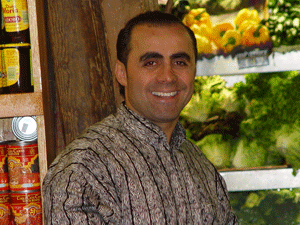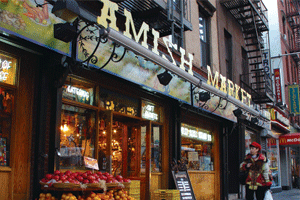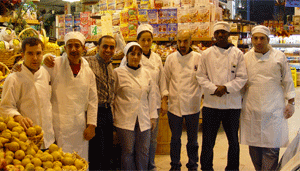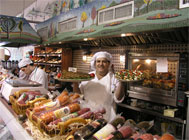Enemies Made Peace and Established a Market Chain
- Written by Admin TOA
- Published in Businessman
It’s lunch time on Wall Street. It is raining, but people are rushing down the street to find a place to eat. With a supermarket and a dining room for 700 people, Zeytuna is among the seekers’ the first choice. The store offers a wide selection of meat, fish, fruit, vegetables, gift items, and even carpets.
The walls are covered with Iznik tiles and the food is from the Turkish cuisine. The three-story store features a Turkish corner, which looks like a Sultan’s Tent. On an average day, eight thousand people shop at Zeytuna, which has a total area of 23 thousand square feet and 65 employees from different backgrounds. Many of them are Turkish students.

Zeytuna is a brand name derived from zeytin, the Turkish word for olive. It opened just one month before the September 11 attacks, a few blocks away from the World Trade Center. The store caught the attention of people working in the area by giving out free water to people escaping from the attacks. (Many people sent checks and money orders along with notes expressing their thanks.) It was also one of the few places that did not lose power after the attack.
While Zeytuna was helping the survivors of the attacks, Amish Market, which is owned by the same people, did not get the same chance. Amish Market, which opened in 1998 under the World Trade Center, is now history. Gevher (Gazkharov) Kamartinova, a 24-year old Uzbek employee of the market at the time, died in the attacks while she was providing catering service to the 98th floor of the South Tower where the plane hit. It was her sixth day on the job, replacing a former employee who had been making office deliveries for three years before her.
FROM A GROCERY TO A BRAND NAME
Founded by Adem Arici and Omer Ipek, Zeytuna is the flagship of this chain market. Two partners opened two Zeytuna, four Amish, four Zeytiniqa, one Zeytinz, one Oliva and one Yeye store together. Mr. Ipek and Arici give company shares to their employees to grow their business. They currently have 38 partners, seven of whom are women. Other partners include an Algerian, an Italian and four Spaniards. While most shareholders are Turkish, only the two founding partners own shares in all the stores. The chain also has stores in Turkey, with seven markets in Bursa.

Adem Arici, who manages operations in the New York region, came to the US in 1986. After saving some money while working as a painter, a hairdresser, and a limousine driver, he opened a grocery stand in 1989, in a kiosk in Brooklyn. It wasn’t long before he attracted attention from the local community and the press when he introduced the concept of the Turkish market style grocery sale. He introduced himself as Tony, an Italian American, in order to be able to buy from the vegetable market hall, which is dominated by Italians. “I was told that it was impossible to do business there unless you are Italian. I introduced myself as the son of a Turkish father and Italian mother. They still think I am half Italian, although I told them that my name is Adem,” says Mr. Arici.
THEY DID NOT SPEAK FOR SIX YEARS
The first grocery store was followed by others. Mr. Arici opened 15 stores in Brooklyn, Long Island and Bronx. He did not speak to Omer Ipek, his current partner, for six years because Mr. Ipek opened a competing store. “We were very good friends, but when we become competitors, the friendship was damaged,” says Mr. Arici. Then one day they sat down together to resolve their issues. They decided to sell their businesses and co-open the first Amish Market under the World Trade Center, with an investment of $2 million.
On September 11, Mr. Arici arrived at the market after the first plane hit the South Tower. After checking to see if there was anybody in the burning store, he turned off the power switch and left that place. Mr. Arici says that although his hopes and efforts of 12 years vanished under the Twin Towers, he and his partner did not stop trying.
After the attacks, the two partners received $88,000 and again, $25,000 in aid from the government. They lost approximately $500,000 since Zeytuna stopped generating income. Shortly after the attacks, Arici and Ipek took a courageous step by opening the second Amish Store in Battery Place, five minutes away from the World Trade Center site. This initiative received wide support and enthusiasm in downtown Manhattan.

Today, all the gourmet stores in New York owned by the partners attract attention by their interior design, product mix, and decoration. “People who see our stores don’t believe that the owners are Turkish,” says Mr. Arici. He adds that they have received letters of appreciation from France, England, and Japan, written by tourists who visited the stores in New York.
Although Zeytuna is packed with customers and employees, Mr. Arici says that they do not make as much as people tend to think. The monthly rent for the store is $45,000.
Mr. Arici emphasizes that they try to treat their employees as friends and that their success lie in the fact that he worked his way up from the bottom. He grew up in a large family with 10 siblings and has been working since he was in elementary school. “I was born in a field and grew up on a farm. Between the ages of 8 and 12, I worked in a repair shop. I came to America when I was 24 and slept on trains,” says Mr. Arici. In the beginning, he worked as a painter in Philadelphia for three weeks until he saved some money ($330) and came to Brooklyn. Mr. Arici says that he is thankful to God for what he owns today.
850 EMPLOYEES
Mr. Arici and Mr. Ipek employ more people than any other Turkish businessmen in the New York region. Their objective is to make Zeytuna an international brand name. According to Mr. Arici, they use an olive-related name for all stores “because the olive symbolizes fertility.” As their growth proves this point, the young businessman says that their priority is to promote Turkish culture.
Among Zeytuna’s regular customers, there are prominent financiers, executives, and the Hollywood star Harrison Ford. In 1999, Amish was named the best supermarket in New York. In 2003, Zeytuna was selected as one of the six best restaurants in New York. The chain currently has 13 stores and employs 850 people, 600 of whom are Turks.

TROPICANA’S CHOICE
Adem Arici and Omer Ipek, owners of the Zeytinia brand, opened two new stores recently. One is located on the ground floor of The Marmara Manhattan on 96th Street in Manhattan. The second store was opened on November 22 in Atlantic City, in partnership with Atilla Yayla. The fourth Zeytinia will be located at The Quarter Shopping Center at the Tropicana and Resort Casino. The store was invited to open in this location by the casino.
Tropicana executives analyzed three markets in New York and decided that the Zeytinia concept would fit their style. When they learned that all three stores were owned by Adem Arici and Omer Ipek, they were surprised. Since they wanted a Cuban-style supermarket in Tropicana Atlantic City, they appreciated the idea of the owners running Amish, Zeytinia and Zeytuna in New York.
Other stores at the Tropicana’s Shopping Centers include Chico’s, a ladies apparel chain with 350 stores in the US, Brooks Brothers, the well-known menswear brand, White House / Black Market, Mondi, Swarovski, the 100-year old crystal maker, Caché, The Old Farmer’s Almanac General Store, the jeweler Erwin Pearl, the Boardwalk Corner Store, that offers various products from eyeglasses to postcards, and Starbucks.
(December 2004, Issue 15th)

Adem Arici, Founder of Zeytuna/Amish Markets chain.
Zeytuna is a brand name derived from zeytin, the Turkish word for olive. It opened just one month before the September 11 attacks, a few blocks away from the World Trade Center. The store caught the attention of people working in the area by giving out free water to people escaping from the attacks. (Many people sent checks and money orders along with notes expressing their thanks.) It was also one of the few places that did not lose power after the attack.
While Zeytuna was helping the survivors of the attacks, Amish Market, which is owned by the same people, did not get the same chance. Amish Market, which opened in 1998 under the World Trade Center, is now history. Gevher (Gazkharov) Kamartinova, a 24-year old Uzbek employee of the market at the time, died in the attacks while she was providing catering service to the 98th floor of the South Tower where the plane hit. It was her sixth day on the job, replacing a former employee who had been making office deliveries for three years before her.
FROM A GROCERY TO A BRAND NAME
Founded by Adem Arici and Omer Ipek, Zeytuna is the flagship of this chain market. Two partners opened two Zeytuna, four Amish, four Zeytiniqa, one Zeytinz, one Oliva and one Yeye store together. Mr. Ipek and Arici give company shares to their employees to grow their business. They currently have 38 partners, seven of whom are women. Other partners include an Algerian, an Italian and four Spaniards. While most shareholders are Turkish, only the two founding partners own shares in all the stores. The chain also has stores in Turkey, with seven markets in Bursa.

One of Amish Markets in New York. (By Serdar Sahin)
Adem Arici, who manages operations in the New York region, came to the US in 1986. After saving some money while working as a painter, a hairdresser, and a limousine driver, he opened a grocery stand in 1989, in a kiosk in Brooklyn. It wasn’t long before he attracted attention from the local community and the press when he introduced the concept of the Turkish market style grocery sale. He introduced himself as Tony, an Italian American, in order to be able to buy from the vegetable market hall, which is dominated by Italians. “I was told that it was impossible to do business there unless you are Italian. I introduced myself as the son of a Turkish father and Italian mother. They still think I am half Italian, although I told them that my name is Adem,” says Mr. Arici.
THEY DID NOT SPEAK FOR SIX YEARS
The first grocery store was followed by others. Mr. Arici opened 15 stores in Brooklyn, Long Island and Bronx. He did not speak to Omer Ipek, his current partner, for six years because Mr. Ipek opened a competing store. “We were very good friends, but when we become competitors, the friendship was damaged,” says Mr. Arici. Then one day they sat down together to resolve their issues. They decided to sell their businesses and co-open the first Amish Market under the World Trade Center, with an investment of $2 million.
On September 11, Mr. Arici arrived at the market after the first plane hit the South Tower. After checking to see if there was anybody in the burning store, he turned off the power switch and left that place. Mr. Arici says that although his hopes and efforts of 12 years vanished under the Twin Towers, he and his partner did not stop trying.
After the attacks, the two partners received $88,000 and again, $25,000 in aid from the government. They lost approximately $500,000 since Zeytuna stopped generating income. Shortly after the attacks, Arici and Ipek took a courageous step by opening the second Amish Store in Battery Place, five minutes away from the World Trade Center site. This initiative received wide support and enthusiasm in downtown Manhattan.

Zeytuna workers are together with Adem Arici.
Today, all the gourmet stores in New York owned by the partners attract attention by their interior design, product mix, and decoration. “People who see our stores don’t believe that the owners are Turkish,” says Mr. Arici. He adds that they have received letters of appreciation from France, England, and Japan, written by tourists who visited the stores in New York.
Although Zeytuna is packed with customers and employees, Mr. Arici says that they do not make as much as people tend to think. The monthly rent for the store is $45,000.
Mr. Arici emphasizes that they try to treat their employees as friends and that their success lie in the fact that he worked his way up from the bottom. He grew up in a large family with 10 siblings and has been working since he was in elementary school. “I was born in a field and grew up on a farm. Between the ages of 8 and 12, I worked in a repair shop. I came to America when I was 24 and slept on trains,” says Mr. Arici. In the beginning, he worked as a painter in Philadelphia for three weeks until he saved some money ($330) and came to Brooklyn. Mr. Arici says that he is thankful to God for what he owns today.
850 EMPLOYEES
Mr. Arici and Mr. Ipek employ more people than any other Turkish businessmen in the New York region. Their objective is to make Zeytuna an international brand name. According to Mr. Arici, they use an olive-related name for all stores “because the olive symbolizes fertility.” As their growth proves this point, the young businessman says that their priority is to promote Turkish culture.
Among Zeytuna’s regular customers, there are prominent financiers, executives, and the Hollywood star Harrison Ford. In 1999, Amish was named the best supermarket in New York. In 2003, Zeytuna was selected as one of the six best restaurants in New York. The chain currently has 13 stores and employs 850 people, 600 of whom are Turks.

TROPICANA’S CHOICE
Adem Arici and Omer Ipek, owners of the Zeytinia brand, opened two new stores recently. One is located on the ground floor of The Marmara Manhattan on 96th Street in Manhattan. The second store was opened on November 22 in Atlantic City, in partnership with Atilla Yayla. The fourth Zeytinia will be located at The Quarter Shopping Center at the Tropicana and Resort Casino. The store was invited to open in this location by the casino.
Tropicana executives analyzed three markets in New York and decided that the Zeytinia concept would fit their style. When they learned that all three stores were owned by Adem Arici and Omer Ipek, they were surprised. Since they wanted a Cuban-style supermarket in Tropicana Atlantic City, they appreciated the idea of the owners running Amish, Zeytinia and Zeytuna in New York.
Other stores at the Tropicana’s Shopping Centers include Chico’s, a ladies apparel chain with 350 stores in the US, Brooks Brothers, the well-known menswear brand, White House / Black Market, Mondi, Swarovski, the 100-year old crystal maker, Caché, The Old Farmer’s Almanac General Store, the jeweler Erwin Pearl, the Boardwalk Corner Store, that offers various products from eyeglasses to postcards, and Starbucks.
(December 2004, Issue 15th)
Last modified onSaturday, 06 May 2017 10:07
Latest from Admin TOA
- World Energy Council Türkiye Holds the Opening Meeting of the Young Energy Leaders (YEL’26) Program
- The Shared Pulse by Eda Uzunkara
- NEO HUMAN 10.0: How Will the Future Be Shaped? (Filiz Dag)
- Calculatit.net Is Bringing Pricing Transparency to America’s Construction Industry
- Support Independent, Trustworthy Journalism








